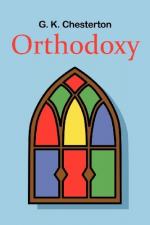
|
| Name: _________________________ | Period: ___________________ |
This test consists of 15 multiple choice questions and 5 short answer questions.
Multiple Choice Questions
1. At the beginning of Chapter VIII, the Romance of Orthodoxy, what does Chesterton name as the cause for busyness in modern society?
(a) Fast-paced life.
(b) Laziness.
(c) Stress.
(d) Bustle.
2. In Chesterton's example of a man's interaction with the tiger, what does evolution not tell the man?
(a) How to imitate the tiger.
(b) How to empathize with the tiger.
(c) How to be tender to the tiger.
(d) How to treat the tiger reasonably.
3. What is Chesterton's stated goal for Chapter VIII, The Romance of Orthodoxy?
(a) To introduce the idea of Christian romance.
(b) To point out that liberal thinking is actually illiberal.
(c) To question the sentimental value of Christianity.
(d) To point out the paradoxes of Christianity.
4. According to Chesterton, what happens when a man worships physical nature?
(a) Man can only then begin to search for God.
(b) Nature becomes pure as it offers salvation.
(c) Nature becomes twisted.
(d) Man is lifted up to God.
5. What does Chesterton call "the most difficult and interesting part of the mental process" that he reached? (Chesterton 2000, pg. 247)
(a) The problem of dealing with human passions.
(b) The fact that love and hate must burn equally strong.
(c) The fact that love and hate must soften each other.
(d) The problem of balance which is presented in the world.
6. In Chesterton's example, why is it important for Gradgrind to give his employees skeptical literature?
(a) He wants to tear down the traditions.
(b) If the ideal always changes, earthly life will stay the same.
(c) He wants to keep their minds sharp.
(d) If their minds always change, they will be content with anything he provides.
7. What is Chesterton's third criterion for progress?
(a) It must be a utopia.
(b) It must be like Eden.
(c) It must be earthly.
(d) It must be heavenly.
8. Chesterton notes a startling difference between Christian and Buddhist art. What is this difference?
(a) Whether the colors are bright or dim.
(b) Whether the people's eyes are open or shut.
(c) Whether the scene is set indoors or outdoors.
(d) Whether the people are predominantly young or old.
9. In the Christian's view, why does a man's soul provide enough outlet for both the optimist and the pessimist?
(a) He now has reason to claim brotherhood with Christ.
(b) He has hope for a heavenly future but fear for an earthly one.
(c) He is exalted as God's creation and humbled as a sinner.
(d) Both passions are allowed free reign.
10. Why does Chesterton say that miracles are eminently desirable?
(a) Man can triumph over nature's cruelty.
(b) Man can begin to understand God.
(c) Miracles give people a glimpse of the supernatural.
(d) Religious people have the opportunity to prove their beliefs.
11. As he began to consider Christianity, what lifted Chesterton's heart and made him happy?
(a) To pray to God for the first time.
(b) To hear he was in the right place.
(c) To hear he was not in the right place.
(d) To find fulfillment of his optimism.
12. What two extremes does Chesterton foresee in man's future?
(a) Sitting absolutely still or smashing the world for fun.
(b) Overpopulation or extermination of humanity.
(c) Christianity or atheism.
(d) Living a fairytale or living in hell.
13. What does Chesterton call "the spike of dogma" that changed his religious opinion? (Chesterton 2000, pg. 234)
(a) God is loving and created the world in his image.
(b) God is all-powerful and created the world.
(c) God is personal and made a world separate from himself.
(d) God can be found in the nature that he made.
14. What is Chesterton's second criterion for progress?
(a) A collection of cultures.
(b) A variety of racial backgrounds.
(c) A composite of happiness.
(d) A devotion to Christianity.
15. Why, according to Christianity, can passions be free?
(a) Because they are kept in their proper places.
(b) Because a believer's conscience keeps him from extreme passions.
(c) Because their consequences will not come until the afterlife.
(d) Because they are monitored by the church.
Short Answer Questions
1. Why does Chesterton call suicide the greatest sin?
2. Chesterton names four standards by which people try to establish the ideals of equality and inequality. What is the first?
3. What is Chesterton's stated purpose in Chapter VI, the Paradoxes of Christianity
4. According to Chesterton, what mindset, paralleling patriotism, leads to reform?
5. What does Chesterton define as the problem with pessimists?
|
This section contains 788 words (approx. 3 pages at 300 words per page) |

|




